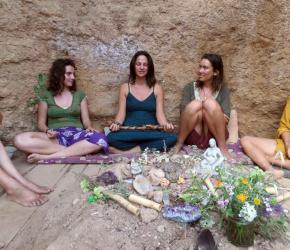We apply multiple tools and methods to work with the social dynamics and to provide meaningful experiences, might it be as a constant ingredient of our day by day or just sporadically on demand.
Tools and methods
Our ways to provide and support the experience
Communal daily life as a game
The community Mandala coordinates daily and common life in an amusing way and allows a fair and flexible distribution of household and social tasks. It also gives an understanding of the different aspects of community life, supports a dynamic and creative being together and encourages to take responsibility and to value the role of our flatmates.
Protected space for profound communication
The talking stick gives each participant the full attention of the entire group. In such protected spaces it is easy to express emotions, impressions, reflections, etc. with others. That way a deep connection in the group is quickly created where each person undergoes comprehension and support for their personal processes.
Sacred space and circular model of existence
This ancient tools of many cultures represents the whole existence as being a circle where each element and each archetype is represented by a specific place in the wheel. Beside some ceremonies it is used to support and map personal and communal processes in a powerful way.
Architecting environments where elements work in tandem, supporting each other in a self-sustaining ecosystem.
Permaculture is a form of whole systems design based on the sustainability of natural systems, seeking to reproduce that sustainability in our living environment.
Employing living plants as integral elements in the construction of spaces and objects.
Living construction involves incorporating living organisms, such as plants, into the design and building processes of structures and objects, blending the natural and built environments.









